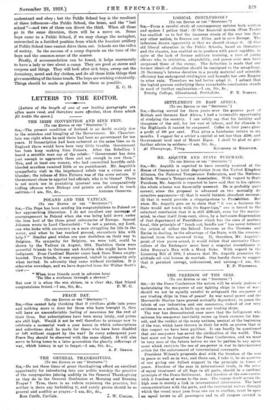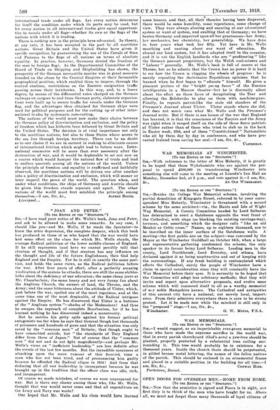THE FREEDOM OF THE SEAS. [To THE EDITOR OF THE
"SPECTATOR."]
SIR,—At the Peace Conference the nation will be wisely jealous oi maintaining the sea-power of our fighting ships in time of War: should we not be equally careful to safeguard the sea-power of our trading ships in time of peace? In war naval power and the Mercantile Marine have proved mutually dependent; in peace the fabrits of our industries and our commerce, indeed of one very existence as a nation, is built up on our trading ships.
The war has demonstrated once more that the belligerent who
misuses his sea-power inevitably raises up fresh enemies for him- self, and the verdict of the many nations, neutral at the beginning of the war, which have thrown in their lot with us proves that in this respect we have been guiltiest. It can hardly be questioned that our sea-power has saved the civilization of the world. This fact must not be forgotten at the Peace Conference, and we must be very .sure of the future before we can be parties to any agree- ment which restricts the use of sea-power in war to international action for the enforcement of international covenants.
President Wilson's proposals deal with the freedom of the seas in peace as well as in war, and there can, I take it, be no question of our giving our fullest support to the principle in times of peace. Freedom of the seas in international trade, in the sense of equal treatment of all flags in all ports, should be a cardinal principle of the Peace Settlement. And freedom of the seas carries with it freedom of &cotes to the seas. The voyage itself across the high seas is merely a link in international intercourse. The land communications with the ports, and the territorial waters through which the vessel must pass from one sea to another, must be open on equal terms to all passengers and to all cargoes carried in
international trade under all flags. Let every nation determine for itself the condition under which its ports may be used, but Jet every nation in all international trades give equal opportuni- ties to vessels under all flags—whether its own or the flags of the nations with which it is trading.
There is nothing new in the principle here advocated. In theory, at any rate, it has been accepted in the past by all maritime nations. Great Britain and the United States have given it specific recognition by guaranteeing the use of the Canals of Suez and Panama to the flags of all nations on terms of absolute equality. In practice, however, Germany denied the freedom of the seas to foreign flags. As the Departmental Committee of the Board of Trade on Shipping and Shipbuilding has shown, the prosperity of the German mercantile marine was in great measure founded on the abuse by the Central Empires of their favourable geographical position, which enabled them to impose, through the control stations, restrictions on the Eastern emigration traffic passing across their territories. In this way, and, to a lesser degree, by means of the differential rates charged on the German railways on cargoes to and from German ports, elaborate organiza- tions were built up to secure traffic for vessels under the German flag, and the advantages thus obtained for German ships were used for political purposes and for the cutting up of other inter- national trades by systematic rate-cutting.
The nations of the world must now make their choice between the German policy of discrimination and exclusion, and the policy of freedom 'which has hitherto been followed by Great Britain and the United States. The decision is of vital importance not only to the maritime nations, but also to those States whose access to the sea lies through foreign territory. There can be no doubt as to our choice if we are in earnest in seeking to eliminate causes of international friction which might lead to future wars. Inter- national commerce will be more than ever necessary after the destruction of war, and it would be deplorable to set out now on a course which would hamper the natural flow of trade and lead to endless quarrels among all the nations of the world. Unless the principle of freedom and equality is reaffirmed and faithfully observed, the maritime nations will be driven one after another into a policy of discrimination and exclusion, which will sooner or later imperil the peace of the world. The question when, and under what conditions, the ships of Germany and Austria should be given this freedom stands separate and apart. The other nations of the world must first establish the principle among



































 Previous page
Previous page